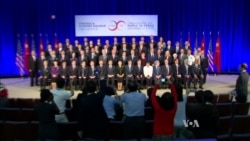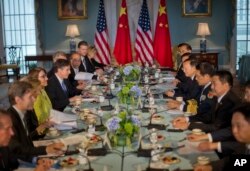A partnership to track sea turtle migration and a joint effort to monitor air pollution near chemical industrial parks were two of the initiatives highlighted on Tuesday at the U.S.-China Strategic and Economic Dialogue.
During a day with a heavy emphasis on environmental cooperation, U.S. and Chinese officials announced a series of new “EcoPartnership” programs – collaborative private sector efforts between the two nations.
“We need these and other innovative solutions to solve our environmental, energy and climate challenges,” said Catherine Novelli, undersecretary of state for economic growth, energy and the environment.
In a briefing late Tuesday, a senior State Department official said more than half of the day’s sessions focused on how the two countries would move forward on climate change issues, an area in which Washington and Beijing already enjoy broad cooperation.
The U.S. and China are two of the world’s biggest greenhouse gas emitters. Both sides pledged support for efforts to cut emissions and serve as a model for other countries.
“Nature has shown human beings a red light” when it comes to climate change, said Chinese Vice Premier Wang Yang.
“Human beings must change the old way of production that relies too much on consumption of resources and the environment,” he said.
Current practices are “too extravagant,” said Wang, speaking at a joint session on climate change.
The annual dialogue gives the U.S. and China a platform to discuss a wide range of issues. This year, they added a special session on development cooperation.
“Our two sides had fruitful discussions on key issues, including post-Ebola recovery efforts, humanitarian assistance and disaster preparedness and response,” said the State Department in a statement released after the session.
During the three-day dialogue, the U.S. is raising thorny issues with China, such as concerns about cyber security, in the wake of a massive U.S. data breach that has affected millions of federal government workers.
Investigators are working to identify the source of the hack. There are suspicions it is linked to China.
Without singling out China, U.S. Vice President Joe Biden said there is an urgent need to agree on a rule-based system for areas such as cyber space.
“Nations that use cyber technology as an economic weapon or profit from the theft of intellectual property are sacrificing tomorrow’s gains for short-term gains today, “ he said.
U.S. officials also raised human rights concerns as well as concerns about China’s controversial land reclamation and island building projects in disputed waters in the South China Sea.
State Councilor Yang Jeichi said China supports “navigation freedom” across the world and considers cyber security important. He said countries should work together to establish an “international code of conduct for cyber sharing information.”
On Wednesday, the emphasis on climate change and the environment resumes with sessions on preserving the oceans and combating wildlife trafficking.
The dialogue also sets the stage for Chinese President Xi Jinping’s visit to Washington in September.






